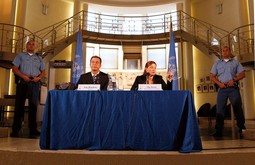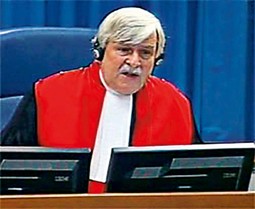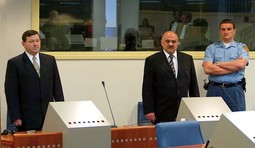Published in Nacional number 735, 2009-12-15
UNEXPECTED help for Croatia
Judge Orie stops Hague prosecution farce
THE DECISION OF THE HAGUE TRIBUNAL'S court chamber to freeze the search for documents and the computers of people close to the Gotovina defence has given Croatian authorities a perfect excuse in the event that EU members reproach Croatia for inadequate cooperation with the Hague tribunal
 SERGE BRAMMERTZ The chief Hague prosecutor broached the issue of the artillery logs after the testimony of the last witness for the prosecution in the trail against three Croatian generals had already been heard – a little too late for the prosecution to remember it lacked the key evidence
Late last week Alphons Orie, the Hague tribunal judge in the trail against Croatian Generals Ante Gotovina, Mladen Markac and Ivan Cermak, provided some unexpected assistance to Croatia in its efforts to join the European Union. The court chamber presided over by Judge Orie last Friday knocked down yet another argument some European Union members might have used to once again challenge Croatia's accession to the Union. Judge Orie helped Croatia by preventing any chance that Croatia might in the future be denied access to the EU by the excuse that it purportedly did not at all cooperate with the Hague prosecution.
SERGE BRAMMERTZ The chief Hague prosecutor broached the issue of the artillery logs after the testimony of the last witness for the prosecution in the trail against three Croatian generals had already been heard – a little too late for the prosecution to remember it lacked the key evidence
Late last week Alphons Orie, the Hague tribunal judge in the trail against Croatian Generals Ante Gotovina, Mladen Markac and Ivan Cermak, provided some unexpected assistance to Croatia in its efforts to join the European Union. The court chamber presided over by Judge Orie last Friday knocked down yet another argument some European Union members might have used to once again challenge Croatia's accession to the Union. Judge Orie helped Croatia by preventing any chance that Croatia might in the future be denied access to the EU by the excuse that it purportedly did not at all cooperate with the Hague prosecution.
After the resolution of the difficult and lengthy diplomatic dispute between Croatia and Slovenia, the issue of Croatian cooperation with the Hague tribunal was once again imposed as the key reason for a possible delay on the Croatian route to EU accession. This cooperation was brought into question over the issue of the so-called artillery logs, documents that would allegedly serve as evidence in the trials of the accused Croatian generals in the Hague, but which Croatia supposedly does not wish to find. In an attempt to pre-empt this inappropriate pressure, Croatian Government carried out a series of police actions aimed at locating the controversial documents, but the Hague prosecution continuously tried to cast Croatia as a country not to be trusted in its efforts to actually find these documents.
Now the situation has changed completely, and Alphons Orie played the key role in this shift. There are a number of reasons why Orie could have made the decision, but two key arguments should be singled out. Also there is the excellent job done in regard to this issue by Justice Minister Ivan Simonovic, who did a very thorough and good job in explaining Croatia's position in this case and the recent testimony given by former Foreign Minister Mate Granic. The testimony given by Mate Granic to the Hague tribunal was, in the opinion of numerous domestic and foreign experts, exceptionally good and comprehensive, and his statements can be considered a significant contribution in the latest shift in the relations between Croatia and the Hague prosecution.
In this shift Orie accepted the request of Ante Gotovina's defence and issued a binding order to Croatia to cease the search of documents and computers seized during last week's police raid against members of the general's defence team.
Thousands of pages of various documents were found during the raids a few days ago in the possession of several members of the Gotovina defence team, and other former high-ranking military officials that played prominent roles in the 1995 Operation Storm, which liberated occupied territories. What was going on in effect was yet another repressive action launched above all under pressure from Hague chief prosecutor Serge Brammertz, who obstinately insists on the proposition that Croatia has not done enough to locate the so-called artillery logs, which, it is his conviction, should be the key evidence against the accused generals on trial at the Hague for several controversial actions during Operation Storm.
Over the past months, the ICTY prosecution has on several occasions pressured Croatia in connection with these documents, which have yet to be found. The Croatian authorities, just as the defence teams representing the accused generals have done, on several occasions tried to explain to the Hague prosecution that everything had been done to find the documents in question. The pressure was increased from time to time, but it all began to look very much like the situation in which Croatia's efforts to join the EU have been repeatedly frustrated by the actions of British spies, when it had been claimed that the then fugitive General Ante Gotovina was hiding in Croatia, but that the Croatian authorities were not trying to locate him. The Croatian authorities were then forced to prove a negative fact, i.e. that Gotovina was not hiding in Croatia. These media-espionage shenanigans were revealed for what they were in the end when Gotovina was apprehended. In the case of the pressure surrounding the artillery logs the end was nowhere in sight until last Friday.
 JUDGE ALPHONS ORIE The Dutch judge leading the trial against Croatian Generals Ante Gotovina, Mladen Markac and Ivan Cermak
That was when Judge Alphons Orie issued a binding order to Croatia that is cease the search of documents and computers seized in a recent police raid against members of the Gotovina defence team and to freeze all examination of seized materials and computers until further notice from the court. The material seized in the police raid on December 9th now has to be sealed, which means it cannot be used by unauthorised persons.
JUDGE ALPHONS ORIE The Dutch judge leading the trial against Croatian Generals Ante Gotovina, Mladen Markac and Ivan Cermak
That was when Judge Alphons Orie issued a binding order to Croatia that is cease the search of documents and computers seized in a recent police raid against members of the Gotovina defence team and to freeze all examination of seized materials and computers until further notice from the court. The material seized in the police raid on December 9th now has to be sealed, which means it cannot be used by unauthorised persons.
By this decision the Hague tribunal has given the Croatian authorities, in the case of the artillery logs, an excuse that will be hard to invalidate. If the Hague prosecution continues its pressure over Croatia's allegedly passive attitude in relation to this issue, the Croatian authorities will always be able to say that the tribunal forbade it. If the tribunal forbids something and orders seized materials sealed, it is hard to maintain that Croatia is passive in this issue.
It is not an unimportant fact that the documentation sought by the Hague prosecution was not found among the seized documents. Croatia has done much in this regard, but there was always pressure to do more. In contact with people informed of the details of the case, Nacional has learned that the Hague prosecution has of late fixed its sights on one key document that is allegedly missing. At issue is a map containing the main plan for artillery activity in the Split Operational Zone, which had been at the military archives in Knin.
The map in question was drawn up by Marko Rajcic, a retired Staff Brigadier, chief artillery officer in the Split Operational Zone during Operation Storm. He was to have testified for the defence, but by a prosecution ploy, he was, with a binding order, moved to the list of prosecution witnesses. With the help of his testimony the prosecution wanted to prove that Gotovina had carried out the ethnic cleansing of "Krajina" Serbs by shelling civilian targets, but Rajcic testified to the opposite. In 2008 Croatian Government had Rajcic draft a report on the use of artillery in Operation Storm. He stated that there were in fact no artillery logs, and drafted the report, and did so on the basis of the controversial document that cannot be found.
He also made a special reinterpretation of the map in question precisely based on the original map, and this reinterpretation was in the end published in Ante Gotovina's book Croatian Army and Croatian Defence Council Battle Assaults and Operations, the first edition of which was published in 1996.
Rajcic has been questioned by the police on the matter on several occasions, but none of it satisfied the Hague prosecution. Probably following the same pattern of manipulation as when it was falsely asserted that Gotovina was hiding in Croatia, some associates of the Hague prosecution have even gone so far, with the help of some Croatian journalists, as to try and create the perception in Croatia that Ante Gotovina personally got rid of artillery logs.
In the crises that have arisen in the relations with the Hague prosecution, Government has voiced its opinion that the misappropriation and destruction of documents was caused by various reasons, including the inexperience and unprofessional comportment of some Croatian Army commanders. Government has told chief Hague prosecutor Serge Brammertz that the requested documents could not serve in proving war crimes, because all commands had an obligatory clause concerning the respect of war conventions and the protection of civilians.
 Mladen Markac, Ivan Cermak and Ante Gotovina have, until recently, served as an excuse for the Hague prosecution in claiming that Croatia's cooperation with the Tribunal was unsatisfactory
In the anxiety over the pressure to locate these documents, which cannot significantly change the process situation in the trial of the three Croatian generals, little time is given to an analysis of when the Hague prosecution actually opened the issue of the artillery logs. It happened on 13 June of last year, when the Hague prosecution requested that Croatia be issued a binding order for the delivery of these documents. The request came only a week after the close of questioning of the last witness for the prosecution, General Alain Forand. Forand was the last in a series of witnesses that was to have spoken of the excessive shelling of Knin, but his testimony did not meet the expectations of the prosecutor.
Mladen Markac, Ivan Cermak and Ante Gotovina have, until recently, served as an excuse for the Hague prosecution in claiming that Croatia's cooperation with the Tribunal was unsatisfactory
In the anxiety over the pressure to locate these documents, which cannot significantly change the process situation in the trial of the three Croatian generals, little time is given to an analysis of when the Hague prosecution actually opened the issue of the artillery logs. It happened on 13 June of last year, when the Hague prosecution requested that Croatia be issued a binding order for the delivery of these documents. The request came only a week after the close of questioning of the last witness for the prosecution, General Alain Forand. Forand was the last in a series of witnesses that was to have spoken of the excessive shelling of Knin, but his testimony did not meet the expectations of the prosecutor.
Sources close to the defence of General Gotovina claim that the Hague prosecution began seeking the allegedly key documentation at an utterly unusual moment - the trial was already ongoing, all their witnesses had been heard, and then someone in the prosecution remembered that they lacked the key elements needed to prove the allegations in the indictment. If the missing artillery logs are the key evidence in the procedure, one has to ask the question on what basis the indictment was drafted?
Just how proficient the Hague prosecutors are can perhaps best been seen from their first request for the delivery of documents they were missing. Late last year Government and the Ante Gotovina defence team received a request for 156 missing documents. Ante Gotovina's attorneys then revealed that they had already received from the Hague prosecution, among the prosecution's evidence and documents it was obliged to disclose to the defence at the start of the trial, 73 of the 156 documents the prosecution was allegedly missing. The prosecution was, then, seeking 73 documents already in its own case file. Later the list was pared down and wound up with some twenty artillery logs. In the end last week there was talk of only a single document.
When the police carried out its latest seizure of documentation, the Hague tribunal judged the raids contentious and ordered that the searches be terminated. Political sources in the know say that there may be a political influence working in the background of the court's decision. The same sources claim that the USA has decided to end the farcical inappropriate pressure on Croatia in connection to the artillery logs, and that it was only then that the court adopted its ruling in the matter, even though it could have done so earlier.
Related articles
The only things he fears is politics
It was with soldierly dignity and restraint that General Ante Gotovina took the latest proposal from the prosecution of the Hague tribunal that he be… Više
Latest news
-
28.10.2010. / 14:15
'A profitable INA is in everyone's interest'
-
28.10.2010. / 09:38
Sanader’s eight fear SDP — Won’t bring down Government
-
21.10.2010. / 15:02
Interior Ministry turned a blind eye on Pukanic assassination
-
20.10.2010. / 09:34
Barisic could bankrupt HDZ




